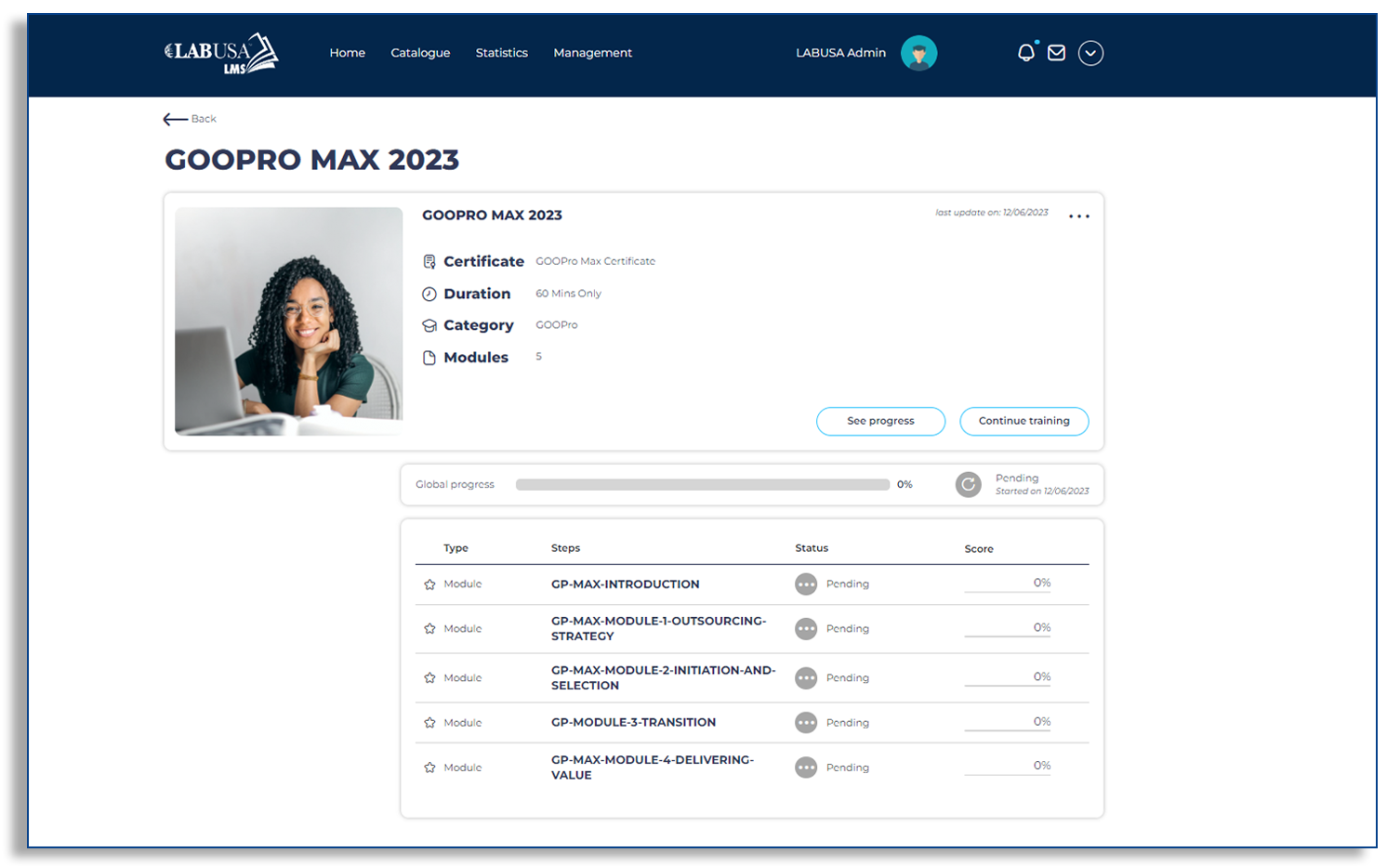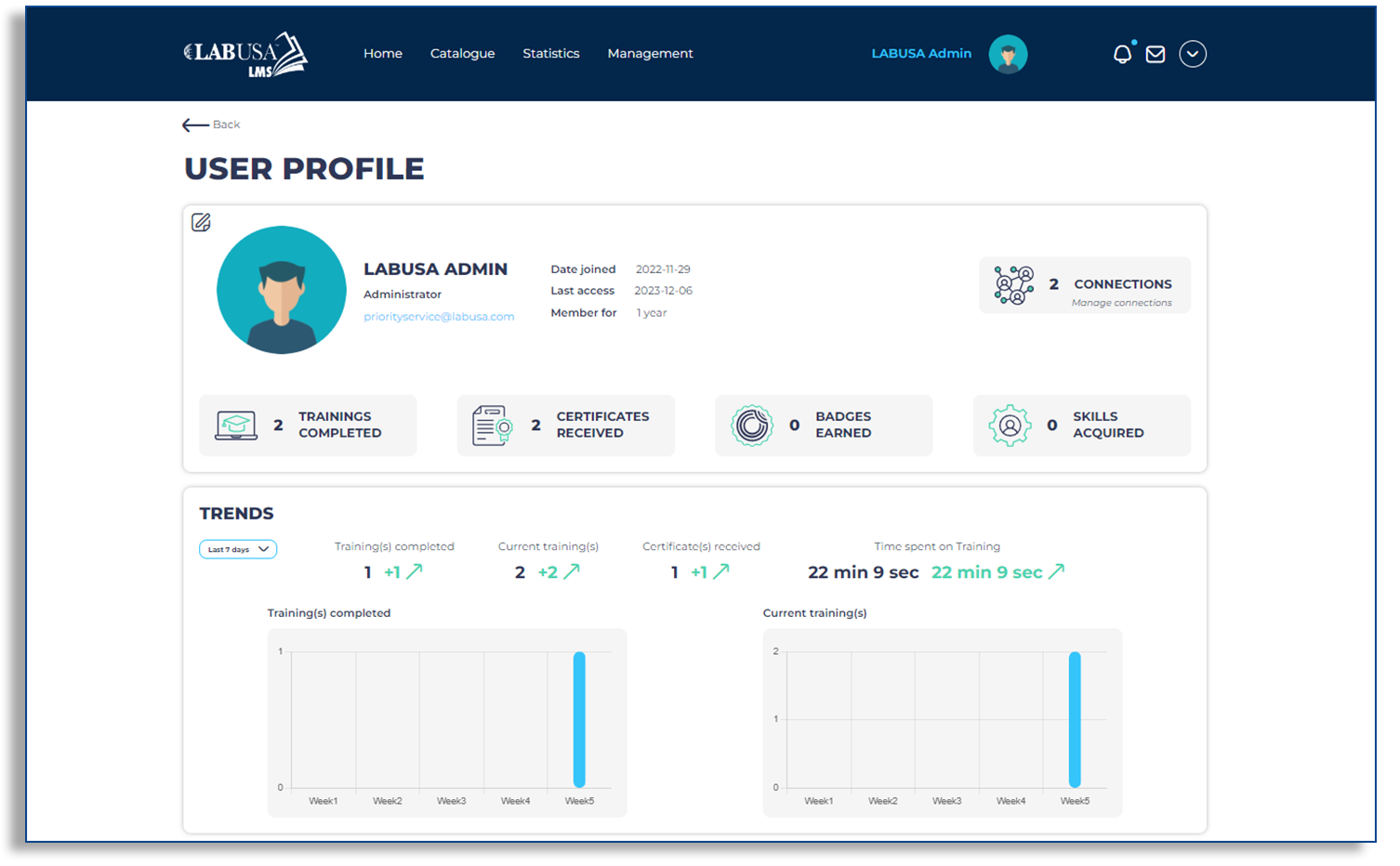AI and Microlearning
AI and Microlearning:
The Perfect Combination for Workforce Agility
In today’s rapidly evolving business environment, workforce agility is critical to maintaining a competitive edge. Employees need to continuously learn, adapt, and develop new skills to keep pace with changes in technology and market demands. Combining Artificial Intelligence (AI) with microlearning has proven to be one of the most effective ways to build and sustain an agile workforce.
At LABUSA, we take this approach further with our Modular Learning Management System (M-LMS). M-LMS is built on a modular, competency-based learning concept, where training is divided into distinct modules designed to help employees develop specific competencies. This approach, powered by AI and delivered through microlearning, provides flexible, personalized, and measurable learning experiences that enable organizations to quickly upskill and reskill their teams.What is Microlearning?
Learning content and delivery mechanism is the key component to building an effective learning environment. LABUSA coordinates learning material and delivery channels customized to participants and organizations. Industry training material and organizational procedures can be converted into compelling online training and delivered through our learning management system (LMS).
Microlearning refers to the practice of delivering short, focused learning modules designed to teach specific skills or concepts in bite-sized chunks. These sessions typically last between 3 to 15 minutes, allowing employees to engage with content without disrupting their workflow.
Key characteristics of microlearning include:
- Short, targeted content: Learning materials are broken into small, manageable pieces.
- Clear, focused goals: Each module teaches one specific skill or concept.
- Engaging formats: Interactive videos, quizzes, and exercises keep learners engaged.
- On-demand accessibility: Employees can access content whenever and wherever they need it, ensuring just-in-time learning.
Microlearning is particularly well-suited for today’s fast-paced work environment, where employees need to quickly gain new skills and apply them on the job.
LABUSA’s M-LMS stands for Modular Learning Management System, a platform designed to support competency-based learning. Unlike traditional learning management systems that focus on course completion, M-LMS breaks learning down into modular units, each focused on specific competencies or skills.
M-LMS is designed to allow employees to progress through these modules at their own pace, achieving mastery of one skill before moving on to the next. By combining modular learning with AI-driven personalization and microlearning, M-LMS ensures that training is efficient, relevant, and measurable.
Technology and Data Architecture
LABUSA's deployment strategy incorporates workload portability across public and private clouds in orchestration with edge devices. The IT architecture enables companies to maintain a learning environment anywhere and anytime. Learn more at labusa.com/cloud-services
The LMS system supports WCAG 2.0 AA compliance, SCORM 1.2 and 2004, and the H5P framework. The software and data architecture provides companies with open-source content collaboration tools supporting industry standards.
The Benefits of AI and Microlearning in a Modular, Competency-Based Learning System
The combination of AI, microlearning, and the modular structure of M-LMS brings numerous benefits, particularly when it comes to workforce agility:
1. Faster Skill Development
M-LMS’s modular structure allows employees to focus on mastering specific competencies quickly. Combined with microlearning, this approach breaks training into short, targeted sessions, enabling faster acquisition of new skills. This means employees can adapt more rapidly to new roles, technologies, or business processes.
2. Just-in-Time Learning
Workforce agility depends on employees having the skills they need when they need them. With LABUSA’s M-LMS, employees can access microlearning modules on-demand, ensuring that they can quickly gain the skills required for immediate tasks or challenges. Whether they need to refresh a competency or learn something new, M-LMS delivers just-in-time training tailored to their needs.
3. Continuous, Measurable Learning
M-LMS’s modular, competency-based approach allows for continuous learning that is easily measured. Employees can progress through modules at their own pace, and AI provides insights into their development. Managers can track which competencies have been mastered and which areas need improvement, allowing for more targeted upskilling and reskilling strategies.
4. Cost-Effective and Scalable Training
Traditional training programs can be costly and time-consuming. M-LMS, with its AI-driven microlearning modules, provides a cost-effective alternative that scales with your business. Modular learning ensures that employees only receive the training they need, minimizing time spent on irrelevant content and reducing overall training costs.
Real-World Applications of AI and Microlearning in M-LMS
Here’s how various industries are leveraging LABUSA’s M-LMS to build more agile, competent workforces:
1. Healthcare
In healthcare, continuous learning is essential as medical technologies and treatments evolve. M-LMS allows healthcare professionals to quickly gain new competencies through modular microlearning that fits into their busy schedules. This ensures that they stay up-to-date with the latest medical practices while maintaining high standards of patient care.
2. Technology and IT
Technology professionals must continuously acquire new skills to keep pace with rapidly evolving software, tools, and best practices. M-LMS offers modular training that enables IT professionals to learn new programming languages, troubleshoot emerging technologies, or update security protocols. The platform ensures that tech employees can quickly gain competencies that are critical to maintaining their competitive edge.
3. Retail and Customer Service
Retail and customer service employees benefit from M-LMS by learning essential competencies like product knowledge, customer service techniques, and sales strategies. The modular learning approach ensures that employees can gain relevant skills quickly, which is crucial in fast-moving industries where customer demands change rapidly.
How to Implement AI-Enhanced M-LMS in Your Organization
Here’s a step-by-step guide to implementing LABUSA’s M-LMS in your organization:
- Assess Competency Needs: Begin by identifying the key competencies your workforce needs to develop. This could range from technical skills to leadership or soft skills.
- Deploy LABUSA’s M-LMS: Roll out the M-LMS platform, making sure it’s accessible to all employees. M-LMS’s mobile-first design ensures that learning can happen anywhere, at any time.
- Develop Modular Content: Work with LABUSA to break down your training programs into specific competency-based modules. Each module should be designed to focus on a single skill or concept.
- Track Progress with AI Analytics: Use M-LMS’s AI-powered analytics to monitor each employee’s progress. Track which competencies have been mastered and adjust learning paths based on performance data.
- Encourage Continuous Learning: Foster a culture that values ongoing learning by providing recognition or incentives for employees who complete modules and develop new competencies.
Conclusion: AI and M-LMS for a More Agile Workforce
Combining AI with microlearning and a modular, competency-based approach is the key to creating a more agile, adaptable workforce. LABUSA’s M-LMS platform offers businesses the tools they need to quickly and efficiently upskill employees, ensuring that they remain competitive in an ever-changing market.
FAQs
1. What is M-LMS, and how does it support competency-based learning?
M-LMS stands for Modular Learning Management System, which is based on the concept of competency-based learning. The platform breaks learning into modules, each focused on developing specific skills or competencies.
2. How does AI personalize the learning experience in M-LMS?
AI in M-LMS analyzes employee data to create personalized learning paths, recommend modules, and adjust content based on performance, ensuring that learning is tailored to each individual’s needs.
3. How can M-LMS help improve workforce agility?
M-LMS provides flexible, modular learning that allows employees to quickly gain and apply new competencies, ensuring they can adapt to new roles, technologies, and challenges in real-time.
4. Is M-LMS suitable for industries with rapidly changing needs?
Yes, M-LMS is ideal for industries like healthcare, technology, and retail, where rapid skill development and continuous learning are critical to maintaining a competitive edge.
5. How can I measure the success of my training programs with M-LMS?
M-LMS includes AI-driven analytics that track employee progress through competency-based modules, providing insights into
Next Steps
If you’re ready to leverage AI and microlearning through LABUSA’s M-LMS to improve your workforce agility, contact us today for a personalized demo.


